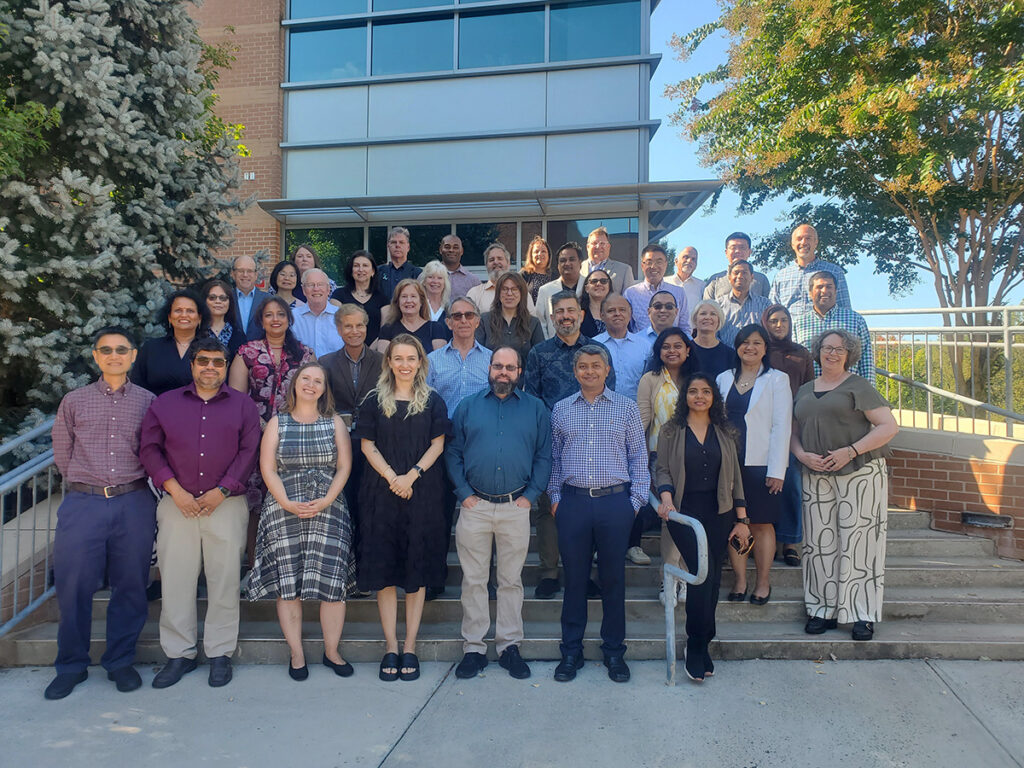Michelle Antero, Ph.D., Copenhagen Business School, mantero1@umbc.edu
Assistant Teaching Professor
 Dr. Antero is an Assistant Teaching Professor in the Department of Information Systems, bringing over two decades of experience in technology leadership, academia, and consulting. She has held faculty and leadership positions internationally, including as Clinical Professor and Associate Dean at the Asian Institute of Management in the Philippines, where she taught graduate courses in strategy, information systems, digital transformation, and cybersecurity, and led curriculum innovation, organizational restructuring, and digital transformation initiatives. Her academic career also includes teaching and research roles at Zayed University in Dubai, Copenhagen Business School, and a visiting scholar appointment at Stanford University.
Dr. Antero is an Assistant Teaching Professor in the Department of Information Systems, bringing over two decades of experience in technology leadership, academia, and consulting. She has held faculty and leadership positions internationally, including as Clinical Professor and Associate Dean at the Asian Institute of Management in the Philippines, where she taught graduate courses in strategy, information systems, digital transformation, and cybersecurity, and led curriculum innovation, organizational restructuring, and digital transformation initiatives. Her academic career also includes teaching and research roles at Zayed University in Dubai, Copenhagen Business School, and a visiting scholar appointment at Stanford University.
A committed educator and mentor, Dr. Antero is passionate about advancing women in STEM, leveraging emerging technologies for business and social impact, and bridging the gap between academia and industry through innovative curriculum design and strategic partnerships. She also serves as Section Editor for the Australasian Journal of Information Systems and regularly contributes to international conferences and publications.
Fiona Bell, Ph.D., University of Colorado at Boulder, fiona.bell@umbc.edu
Assistant Professor
 Dr. Bell is an Assistant Professor in the Department of Information Systems, specializing in research at the intersection of human-computer interaction, material science, and biodesign. Her work in the emerging field of Biological Human-Computer Interaction (Bio-HCI) focuses on developing sustainable, responsive bio-digital interfaces that bridge the biological and digital worlds. A 2024 Rising Star in EECS, Dr. Bell also serves as an Expert Consultant for the international Biodesign Challenge and a judge for the iGEM Global BioArt Competition. She earned her Ph.D. in Creative Technology and Design from the ATLAS Institute at the University of Colorado Boulder and her B.S. in Mechanical Engineering from Santa Clara University.
Dr. Bell is an Assistant Professor in the Department of Information Systems, specializing in research at the intersection of human-computer interaction, material science, and biodesign. Her work in the emerging field of Biological Human-Computer Interaction (Bio-HCI) focuses on developing sustainable, responsive bio-digital interfaces that bridge the biological and digital worlds. A 2024 Rising Star in EECS, Dr. Bell also serves as an Expert Consultant for the international Biodesign Challenge and a judge for the iGEM Global BioArt Competition. She earned her Ph.D. in Creative Technology and Design from the ATLAS Institute at the University of Colorado Boulder and her B.S. in Mechanical Engineering from Santa Clara University.
Michael Brown, Ph.D., Nova Southeastern University, michaelb@umbc.edu
Professor of Practice, Liaison for External Partnerships – Online M.S. in IS
 Dr. Brown is a Professor of Practice and Liaison for External Partnerships for the Online M.S. program. He has experience in industry, entrepreneurship, academics, and research. He worked for more than 20 years in the technology field eventually holding many leadership positions including Technical Manager of Business Process Robotics and Automation. At Sun Microsystems he was a pre-sales Java Engineer. He founded the consulting company, Valhalla Data Systems, which had contracts with many large government agencies and system integrators. Dr. Brown was also a minority shareholder in a small biometric authentication company. He has taught college classes at 14 universities over 20 years. He has a long track record of conducting and publishing research with nontraditional students. He is a Fulbright recipient, Senior Member in both IEEE and ACM and twice won the Online Learning Consortium’s Effective Practice Award. He holds a PhD from Nova Southeastern University and a Masters and Bachelors from Shippensburg University.
Dr. Brown is a Professor of Practice and Liaison for External Partnerships for the Online M.S. program. He has experience in industry, entrepreneurship, academics, and research. He worked for more than 20 years in the technology field eventually holding many leadership positions including Technical Manager of Business Process Robotics and Automation. At Sun Microsystems he was a pre-sales Java Engineer. He founded the consulting company, Valhalla Data Systems, which had contracts with many large government agencies and system integrators. Dr. Brown was also a minority shareholder in a small biometric authentication company. He has taught college classes at 14 universities over 20 years. He has a long track record of conducting and publishing research with nontraditional students. He is a Fulbright recipient, Senior Member in both IEEE and ACM and twice won the Online Learning Consortium’s Effective Practice Award. He holds a PhD from Nova Southeastern University and a Masters and Bachelors from Shippensburg University.
Jennifer Carter, D.M., University of Maryland, jcarter@umbc.edu
Professor of Practice, Undergraduate Program Director – BTA
 Dr. Jennifer Carter received her Doctor of Management degree and Bachelor of Science in electrical engineering from the University of Maryland. Prior to joining UMBC, Dr. Carter retired from a government career as an engineer and senior executive. Her experience includes designing information collection and analysis systems, managing the modernization of Navy business systems, and leading the development of major defense information technology portfolios. Dr. Carter’s experience includes adjunct faculty positions for Information Systems Management at UMUC and Computer Science at Howard Community College. Her government awards include both Meritorious and Exceptional Civilian Service awards.
Dr. Jennifer Carter received her Doctor of Management degree and Bachelor of Science in electrical engineering from the University of Maryland. Prior to joining UMBC, Dr. Carter retired from a government career as an engineer and senior executive. Her experience includes designing information collection and analysis systems, managing the modernization of Navy business systems, and leading the development of major defense information technology portfolios. Dr. Carter’s experience includes adjunct faculty positions for Information Systems Management at UMUC and Computer Science at Howard Community College. Her government awards include both Meritorious and Exceptional Civilian Service awards.
C. Augusto Casas, Ph.D., Nova Southeastern University, acasas@umbc.edu
Associate Teaching Professor
Lujie Karen Chen, Ph.D., Carnegie Mellon University, lujiec@umbc.edu
Assistant Professor
 My research is guided by an overarching framework in promoting human flourishing by leveraging the power of data and human-centered computing under the umbrella of “Informatics for Human Flourishing” (lab website: flourish.umbc.edu). This vision is to be realized through two parallel themes: (1) use-inspired research in application domains with clear pathways toward human flourishing (e.g. healthcare, education, work, and family); (2) building a unifying multimodal data-driven human-centered methodological framework to understand and characterize the dynamic and fine-grained human physiological and psychological processes in order improve the flourishing outcomes. I received Ph.D. and master’s degree in Information Systems and M.S. in Statistics, all from Carnegie Mellon. Before I moved to UMBC in 2020, I was a research staff member at Auton Lab at Carnegie Mellon.
My research is guided by an overarching framework in promoting human flourishing by leveraging the power of data and human-centered computing under the umbrella of “Informatics for Human Flourishing” (lab website: flourish.umbc.edu). This vision is to be realized through two parallel themes: (1) use-inspired research in application domains with clear pathways toward human flourishing (e.g. healthcare, education, work, and family); (2) building a unifying multimodal data-driven human-centered methodological framework to understand and characterize the dynamic and fine-grained human physiological and psychological processes in order improve the flourishing outcomes. I received Ph.D. and master’s degree in Information Systems and M.S. in Statistics, all from Carnegie Mellon. Before I moved to UMBC in 2020, I was a research staff member at Auton Lab at Carnegie Mellon.
Zhiyuan Chen, Ph.D., Cornell University, zhchen@umbc.edu
Professor and Chair
 My research covers following areas: Privacy preserving data mining and data management. I am interested in algorithms for preserving privacy of data and at the same time allows accurate analysis of the data. Data Exploration and Navigation. Database users often find it difficult to find useful information from databases. Their queries often return too many irrelevant answers. I am interested in using data mining, navigation, and information retrieval techniques to help user narrow down their scope of search and quickly locate relevant answers. Semantic-based Search and Data Integration Using Semantic Networks. My research develops a technique that uses semantic network to capture relationships between data objects and helps users find related information. The semantic network can also be used in data integration to find relevant data sets to integrate.
My research covers following areas: Privacy preserving data mining and data management. I am interested in algorithms for preserving privacy of data and at the same time allows accurate analysis of the data. Data Exploration and Navigation. Database users often find it difficult to find useful information from databases. Their queries often return too many irrelevant answers. I am interested in using data mining, navigation, and information retrieval techniques to help user narrow down their scope of search and quickly locate relevant answers. Semantic-based Search and Data Integration Using Semantic Networks. My research develops a technique that uses semantic network to capture relationships between data objects and helps users find related information. The semantic network can also be used in data integration to find relevant data sets to integrate.
Edward Dillon, Ph.D., University of Alabama, edwarddi@umbc.edu
Associate Professor
 Edward Dillon is an Associate Professor in the Department of Information Systems at UMBC. His research focuses on human-centered computing with emphasis on computer science education and broadening participation in computing. Dr. Dillon has received ~$3.7 million in research funding and awards from external agencies and non-profit organizations, including the National Science Foundation (NSF), the Maryland Pre-Service Computer Science Teacher Education Program (MCCE), and the Collaborative Research Experience for Undergraduates (CREU – CRA-WP). He has also conducted a Faculty in Residency at Google during the summer of 2018 to learn more about this company’s culture, practices, and to understand the expectations for candidates (e.g. aspiring CS majors) who pursue career opportunities at this company and related prominent companies in tech.
Edward Dillon is an Associate Professor in the Department of Information Systems at UMBC. His research focuses on human-centered computing with emphasis on computer science education and broadening participation in computing. Dr. Dillon has received ~$3.7 million in research funding and awards from external agencies and non-profit organizations, including the National Science Foundation (NSF), the Maryland Pre-Service Computer Science Teacher Education Program (MCCE), and the Collaborative Research Experience for Undergraduates (CREU – CRA-WP). He has also conducted a Faculty in Residency at Google during the summer of 2018 to learn more about this company’s culture, practices, and to understand the expectations for candidates (e.g. aspiring CS majors) who pursue career opportunities at this company and related prominent companies in tech.
James Foulds, Ph.D., University of California, Irvine, jfoulds@umbc.edu
Associate Professor, Graduate Program Director – Online M.S. in IS
 James (a.k.a. Jimmy) Foulds is an Associate Professor and the Graduate Program Director, Online M.S. in the Department of Information Systems at UMBC. His research interests are in both applied and foundational machine learning, focusing on probabilistic latent variable models and the inference algorithms to learn them from data. His work aims to promote the practice of latent variable modeling for multidisciplinary research in areas including computational social science and the digital humanities. He earned his Ph.D. in computer science at the University of California, Irvine, and was a postdoctoral scholar at the University of California, Santa Cruz, followed by the University of California, San Diego. His master’s and bachelor’s degrees were earned with first class honors at the University of Waikato, New Zealand, where he also contributed to the Weka data mining system.
James (a.k.a. Jimmy) Foulds is an Associate Professor and the Graduate Program Director, Online M.S. in the Department of Information Systems at UMBC. His research interests are in both applied and foundational machine learning, focusing on probabilistic latent variable models and the inference algorithms to learn them from data. His work aims to promote the practice of latent variable modeling for multidisciplinary research in areas including computational social science and the digital humanities. He earned his Ph.D. in computer science at the University of California, Irvine, and was a postdoctoral scholar at the University of California, Santa Cruz, followed by the University of California, San Diego. His master’s and bachelor’s degrees were earned with first class honors at the University of Waikato, New Zealand, where he also contributed to the Weka data mining system.
Aryya Gangopadhyay, Ph.D., Rutgers University, gangopad@umbc.edu
Professor
 Aryya Gangopadhyay is a Professor in the Department of Information Systems at UMBC. He has been a faculty member at UMBC since 1997. His recent courses include Computational Methods in Information Systems Research, Introduction to Data Mining, and Database Management Systems.
Aryya Gangopadhyay is a Professor in the Department of Information Systems at UMBC. He has been a faculty member at UMBC since 1997. His recent courses include Computational Methods in Information Systems Research, Introduction to Data Mining, and Database Management Systems.
Dr. Gangopadhyay’s research interests are in the areas of databases and data mining. Currently, he is focused on privacy preserving data mining, spatio-temporal data mining, and data mining for health informatics. His research has been funded by grants from NSF, NIST, US Department of Education, Maryland Department of Transportation, and other agencies. Dr. Gangopadhyay has published five books and nearly 100 research articles. He holds a Ph.D. in Computer Information Systems from Rutgers University.
Md Osman Gani, Ph.D., Marquette University, mogani@umbc.edu
Assistant Professor
 Md Osman Gani is an Assistant Professor in the Department of Information Systems at UMBC. He is also a faculty research associate in the Regenstrief Center for Healthcare Engineering at Purdue University. His research centers in artificial intelligence, causal inference, and machine learning with an interest in contributing to a deeper understanding of cause and context. His research interests include explainable artificial intelligence, ubiquitous computing, indoor localization, healthcare, and human activity recognition. The foundation of his research has applied the knowledge from computer science, applied mathematics, and statistics Before joining UMBC, he was a Visiting Assistant Professor in the department of computer science and software engineering at Miami University. He received BS in Computer Science and Engineering from Military Institute of Science & Technology, Bangladesh, MS and Ph.D. in Computational Sciences from Marquette University.
Md Osman Gani is an Assistant Professor in the Department of Information Systems at UMBC. He is also a faculty research associate in the Regenstrief Center for Healthcare Engineering at Purdue University. His research centers in artificial intelligence, causal inference, and machine learning with an interest in contributing to a deeper understanding of cause and context. His research interests include explainable artificial intelligence, ubiquitous computing, indoor localization, healthcare, and human activity recognition. The foundation of his research has applied the knowledge from computer science, applied mathematics, and statistics Before joining UMBC, he was a Visiting Assistant Professor in the department of computer science and software engineering at Miami University. He received BS in Computer Science and Engineering from Military Institute of Science & Technology, Bangladesh, MS and Ph.D. in Computational Sciences from Marquette University.
Dina Glazer, M.S., UMBC, dgorin1@umbc.edu
Associate Teaching Professor, Associate Undergraduate Program Director – Advising
 Dina Glazer has a B.S. in Information Systems and M.S. in Operations Analysis. She has been teaching networking and data communications courses at UMBC since 2000. Dina has multiple years of industry experience as a Network Administrator/Engineer.
Dina Glazer has a B.S. in Information Systems and M.S. in Operations Analysis. She has been teaching networking and data communications courses at UMBC since 2000. Dina has multiple years of industry experience as a Network Administrator/Engineer.
Foad Hamidi, Ph.D., York University, foadhamidi@umbc.edu
Associate Professor, Graduate Program Director – HCC
 My research is focused on the participatory design and evaluation of emerging systems, including digital living media systems and adaptive systems, for different users including children and adults with and without disabilities. I am also interested in designing inclusive and sustainable maker processes, tools and programs for diverse communities.
My research is focused on the participatory design and evaluation of emerging systems, including digital living media systems and adaptive systems, for different users including children and adults with and without disabilities. I am also interested in designing inclusive and sustainable maker processes, tools and programs for diverse communities.
Md Tariqul Islam, Ph.D., University of Kentucy, mtislam@umbc.edu
Assistant Professor
 Dr. Islam is an Assistant Professor in the Department of Information Systems, specializing in trustworthy cyberspace with a focus on the security, efficiency, and fault tolerance of networks and distributed systems. His research spans cloud and blockchain technologies, where he develops novel algorithms, protocols, and frameworks to enhance system reliability, security, and scalability. His recent work explores strengthening blockchain consensus mechanisms using multi-agent reinforcement learning, game theory, and zero-shot learning to detect malicious activity and ensure consensus integrity. He holds a Ph.D. and M.S. in Computer Science from the University of Kentucky and a B.S. in Computer Science and Engineering from the University of Dhaka.
Dr. Islam is an Assistant Professor in the Department of Information Systems, specializing in trustworthy cyberspace with a focus on the security, efficiency, and fault tolerance of networks and distributed systems. His research spans cloud and blockchain technologies, where he develops novel algorithms, protocols, and frameworks to enhance system reliability, security, and scalability. His recent work explores strengthening blockchain consensus mechanisms using multi-agent reinforcement learning, game theory, and zero-shot learning to detect malicious activity and ensure consensus integrity. He holds a Ph.D. and M.S. in Computer Science from the University of Kentucky and a B.S. in Computer Science and Engineering from the University of Dhaka.
Vandana Janeja, Ph.D., Rutgers University, vjaneja@umbc.edu
Professor, Associate Dean for Research
 My area of interest is Data mining specifically anomaly detection and spatio-temporal data mining. Overall, my work has focused on advancing theoretical research motivated by practical applications. As a result, I have had the opportunity to participate in the various aspects of high impact and national interest projects with various government agencies and private organizations. My research has always resulted in strong proof of concepts in real world applications with underlying strong theoretical foundations. Most of this work has been possible due to the diligent work of my students. Some of my current students and their ongoing research projects are highlighted in the following. View the publications list for more details.
My area of interest is Data mining specifically anomaly detection and spatio-temporal data mining. Overall, my work has focused on advancing theoretical research motivated by practical applications. As a result, I have had the opportunity to participate in the various aspects of high impact and national interest projects with various government agencies and private organizations. My research has always resulted in strong proof of concepts in real world applications with underlying strong theoretical foundations. Most of this work has been possible due to the diligent work of my students. Some of my current students and their ongoing research projects are highlighted in the following. View the publications list for more details.
Karuna P Joshi, Ph.D., UMBC, karuna.joshi@umbc.edu
Professor, Associate Dean for Faculty Affairs
 Karuna Pande Joshi is a Professor of Information Systems at UMBC. She is also affiliated with the Computer Science department. Her research areas are Data Science, Cloud Computing, Services Science and Healthcare IT systems. Her research is supported by ONR, NSF, DoD, IBM, GE and Cisco. She teaches courses in Big Data, Software Engineering and Systems Design. She received her MS and PhD in Computer Science from UMBC, where she was twice awarded the IBM PhD Fellowship, and her Bachelors in Computer Engineering from the University of Mumbai, India.
Karuna Pande Joshi is a Professor of Information Systems at UMBC. She is also affiliated with the Computer Science department. Her research areas are Data Science, Cloud Computing, Services Science and Healthcare IT systems. Her research is supported by ONR, NSF, DoD, IBM, GE and Cisco. She teaches courses in Big Data, Software Engineering and Systems Design. She received her MS and PhD in Computer Science from UMBC, where she was twice awarded the IBM PhD Fellowship, and her Bachelors in Computer Engineering from the University of Mumbai, India.
Dr. Joshi also has extensive experience of working in the industry primarily as an IT manager. She worked at the International Monetary Fund for nearly a decade. She has also worked for MORENet, Missouri and Silverline Industries Ltd. in India. Her managerial experience includes IT Portfolio management, Program/Project management and Change Management.
Margaret Kahl, kahl@umbc.edu
Assistant Teaching Professor
 Margaret Kahl has a B.S. in Information Systems and a M.S. in Operations Analysis. She has taught at UMBC since 1990 (as well as other universities during that time). Margaret Kahl’s courses include: Systems Analysis and Design, Integrating Technology into Business Operations; Database Design, Management Information Systems, Project Management, Decision Support Systems, and Management at undergraduate and graduate levels. In addition to her academic background, she has extensive industry experience as a Systems Analyst.
Margaret Kahl has a B.S. in Information Systems and a M.S. in Operations Analysis. She has taught at UMBC since 1990 (as well as other universities during that time). Margaret Kahl’s courses include: Systems Analysis and Design, Integrating Technology into Business Operations; Database Design, Management Information Systems, Project Management, Decision Support Systems, and Management at undergraduate and graduate levels. In addition to her academic background, she has extensive industry experience as a Systems Analyst.
George Karabatis, Ph.D., University of Houston, georgek@umbc.edu
Professor, Liaison for Programmatic Innovations
 George Karabatis is a Professor of Information Systems at UMBC. He holds degrees in Computer Science (Ph.D. and M.S.) and Mathematics (B.S.). His research interests are on various aspects of database systems, including semantic information integration, and applications for mobile handheld devices. Before joining UMBC he was a Research Scientist at Telcordia Technologies (formerly Bellcore) working on database related research for the telecom industry. His research work has been published in journals (such as Journal of Database Management, Decision Support Systems, Information Systems Frontier, Distributed and Parallel Databases, IEEE Computer), conference proceedings and book chapters.
George Karabatis is a Professor of Information Systems at UMBC. He holds degrees in Computer Science (Ph.D. and M.S.) and Mathematics (B.S.). His research interests are on various aspects of database systems, including semantic information integration, and applications for mobile handheld devices. Before joining UMBC he was a Research Scientist at Telcordia Technologies (formerly Bellcore) working on database related research for the telecom industry. His research work has been published in journals (such as Journal of Database Management, Decision Support Systems, Information Systems Frontier, Distributed and Parallel Databases, IEEE Computer), conference proceedings and book chapters.
Todd A Karner, DHA, Central Michigan University, toddkarn@umbc.edu
Assistant Teaching Professor and Assistant Graduate Program Director – HIT
 Todd A. Karner, BSN, MHA, DHA, FACHE is an Assistant Teaching Professor and Assistant Graduate Program Director in the Health Informatics program at the University of Maryland, Baltimore County (UMBC). With over 20 years of executive leadership experience in population health, healthcare technology, and value-based care, Dr. Karner brings a wealth of industry expertise to his teaching and mentorship.
Todd A. Karner, BSN, MHA, DHA, FACHE is an Assistant Teaching Professor and Assistant Graduate Program Director in the Health Informatics program at the University of Maryland, Baltimore County (UMBC). With over 20 years of executive leadership experience in population health, healthcare technology, and value-based care, Dr. Karner brings a wealth of industry expertise to his teaching and mentorship.
Before joining UMBC, Dr. Karner held senior leadership roles at Lumeris, Health Catalyst, Caravan Health, and Cerner, where he led business development, strategic partnerships, and sales initiatives for hospitals, health systems, and ACOs nationwide. His research and professional focus center on healthcare analytics, risk-based contracting, and the application of AI in population health management.
Dr. Karner holds a Doctor of Health Administration (DHA) from Central Michigan University, an MHA from the University of Maryland, College Park, and a BSN from the University of Rochester. He is a Fellow of the American College of Healthcare Executives (FACHE) and actively contributes to initiatives in health informatics, population health strategy, and value-based care innovation.
Andrea Kleinsmith, Ph.D., University College London, UK, andreak@umbc.edu
Associate Professor
 Andrea Kleinsmith is an Associate Professor in the Department of Information Systems. Andrea’s primary research interests are in Human-Computer Interaction and Affective Computing and focus on measuring and modeling body expressions in real world training situations. In one area, she examines human behaviors such as empathy that may be understood from medical students’ interactions with virtual patient training systems. In another area, she models users’ body expressions in order to endow systems with the ability to automatically recognize affect from the body. Andrea’s current aim is to build affect recognition training systems for complex real world situations in the wild with populations such as first responders and other emergency services. Dr. Kleinsmith has held postdoctoral researcher positions in the Virtual Experiences Research Group in the Computer and Information Science and Engineering Department at the University of Florida and in the Embodied AudioVisual Interaction Group at Goldsmiths, University of London in the UK. She received a PhD in Computer Science from University College London, UK, an MSc in Computer Science from the University of Aizu in Japan, and a BA in Psychology from the University of Oregon.
Andrea Kleinsmith is an Associate Professor in the Department of Information Systems. Andrea’s primary research interests are in Human-Computer Interaction and Affective Computing and focus on measuring and modeling body expressions in real world training situations. In one area, she examines human behaviors such as empathy that may be understood from medical students’ interactions with virtual patient training systems. In another area, she models users’ body expressions in order to endow systems with the ability to automatically recognize affect from the body. Andrea’s current aim is to build affect recognition training systems for complex real world situations in the wild with populations such as first responders and other emergency services. Dr. Kleinsmith has held postdoctoral researcher positions in the Virtual Experiences Research Group in the Computer and Information Science and Engineering Department at the University of Florida and in the Embodied AudioVisual Interaction Group at Goldsmiths, University of London in the UK. She received a PhD in Computer Science from University College London, UK, an MSc in Computer Science from the University of Aizu in Japan, and a BA in Psychology from the University of Oregon.
Anita Komlodi, Ph.D., University of Maryland, komlodi@umbc.edu
Associate Professor
 Anita Komlodi is an Associate Professor. Dr. Komlodi’s research interests fall in the area of Human-Centered Computing. The first area of concentration is at the intersection of Human-Centered Computing and Information Retrieval/Information Behavior and focuses on the study of Human Information Behavior and the design of user interfaces for information systems. Dr. Komlodi is also interested in the needs of diverse user groups go technology: age, gender, and cultural differences in technology interactions. Dr. Komlodi’s teaching reflects these interests in courses on Human-Centered Computing, Web Design, and User Interfaces for Information Retrieval and Visualization.
Anita Komlodi is an Associate Professor. Dr. Komlodi’s research interests fall in the area of Human-Centered Computing. The first area of concentration is at the intersection of Human-Centered Computing and Information Retrieval/Information Behavior and focuses on the study of Human Information Behavior and the design of user interfaces for information systems. Dr. Komlodi is also interested in the needs of diverse user groups go technology: age, gender, and cultural differences in technology interactions. Dr. Komlodi’s teaching reflects these interests in courses on Human-Centered Computing, Web Design, and User Interfaces for Information Retrieval and Visualization.
Yasmine Kotturi, Ph.D, Carnegie Mellon University, kotturi@umbc.edu
Assistant Professor
 Yasmine Kotturi is an Assistant Professor in the Department of Information Systems. Her research investigates how marginalized gig workers and entrepreneurs use peer support to overcome technical barriers and grow their careers. Kotturi has been recognized as an EECS Rising Star and Siebel Scholar. In her work, Kotturi has been fortunate to collaborate with local nonprofits as well as companies such as Instagram and Etsy. Kotturi holds a Ph.D. in Human-Computer Interaction from Carnegie Mellon University and has worked at Microsoft Research Asia and MIT’s Teaching Systems Lab.
Yasmine Kotturi is an Assistant Professor in the Department of Information Systems. Her research investigates how marginalized gig workers and entrepreneurs use peer support to overcome technical barriers and grow their careers. Kotturi has been recognized as an EECS Rising Star and Siebel Scholar. In her work, Kotturi has been fortunate to collaborate with local nonprofits as well as companies such as Instagram and Etsy. Kotturi holds a Ph.D. in Human-Computer Interaction from Carnegie Mellon University and has worked at Microsoft Research Asia and MIT’s Teaching Systems Lab.
Ravi Kuber, Ph.D., Queen’s University Belfast, Northern Ireland, rkuber@umbc.edu
Associate Professor, Associate Dean for Graduate Education
 Ravi Kuber is an Associate Professor of Information Systems at UMBC. His research examines the ways that the sense of touch can be used within an interface, when the user’s visual channel is blocked, restricted or overloaded. He has designed haptic and multimodal interfaces to support individuals who are blind and older adults to overcome the barriers faced when accessing graphical user interfaces. He has also examined ways to develop tactile feedback to augment the process of mobile interaction. Other areas of interest include applying non-visual technologies to address the trade-offs associated with authentication. He received his Ph.D. from Queen’s University Belfast, Northern Ireland, and M.Sc. and B.Sc. degrees from University College London, UK.
Ravi Kuber is an Associate Professor of Information Systems at UMBC. His research examines the ways that the sense of touch can be used within an interface, when the user’s visual channel is blocked, restricted or overloaded. He has designed haptic and multimodal interfaces to support individuals who are blind and older adults to overcome the barriers faced when accessing graphical user interfaces. He has also examined ways to develop tactile feedback to augment the process of mobile interaction. Other areas of interest include applying non-visual technologies to address the trade-offs associated with authentication. He received his Ph.D. from Queen’s University Belfast, Northern Ireland, and M.Sc. and B.Sc. degrees from University College London, UK.
Ida Ngambeki, Ph.D., Purdue University, idan1@umbc.edu
Assistant Professor
 Dr. Ida Ngambeki is an Assistant Professor of Information Systems at the University of Maryland Baltimore County. Previously she was an Assistant Professor of Computer and Information Technology at Purdue University. Dr. Ngambeki graduated from Smith College with a B.S. in Engineering and from Purdue University with a PhD in Engineering Education. Dr. Ngambeki’s key areas of research interest include: Cybersecure behavior, social engineering, cybersecurity Education, cybersecurity Policy, and cybersecurity workforce development. Dr. Ngambeki’s research investigates human factors in cybersecurity, how the affordances of information technologies affect individuals’ learning and decision-making and the wider policy implications of those choices, how social and personality factors can be manipulated to compromise cybersecurity, the social and psychological factors influencing individuals’ cybersecurity choices, how students learn secure programming, how individuals develop an interest in and make-decisions about their careers in computing and how individuals use information technology to engage in political participation.
Dr. Ida Ngambeki is an Assistant Professor of Information Systems at the University of Maryland Baltimore County. Previously she was an Assistant Professor of Computer and Information Technology at Purdue University. Dr. Ngambeki graduated from Smith College with a B.S. in Engineering and from Purdue University with a PhD in Engineering Education. Dr. Ngambeki’s key areas of research interest include: Cybersecure behavior, social engineering, cybersecurity Education, cybersecurity Policy, and cybersecurity workforce development. Dr. Ngambeki’s research investigates human factors in cybersecurity, how the affordances of information technologies affect individuals’ learning and decision-making and the wider policy implications of those choices, how social and personality factors can be manipulated to compromise cybersecurity, the social and psychological factors influencing individuals’ cybersecurity choices, how students learn secure programming, how individuals develop an interest in and make-decisions about their careers in computing and how individuals use information technology to engage in political participation.
Patti Ordóñez, Ph.D., UMBC, patti.ordonez@umbc.edu
Associate Professor
 Dr. Patricia Ordóñez-Franco joins the Department of Information Systems of the University of Maryland Baltimore County as an Associate Professor. Her research interests are in applying machine learning, data mining, and visualization to multivariate time series analysis, specifically to large repositories of clinical and biological data (now known as Clinical Informatics and Biomedical Data Science), creating a voice programming language (assistive technology), and advocating and working towards high-quality computer and data science education for all. She was the first Latina to graduate with a Ph.D. from the College of Engineering and Information Technology at the University of Maryland Baltimore County and the first female Associate Professor to earn tenure in the Computer Science Department at the University of Puerto Rico Río Piedras (UPRRP). She is a former National Science Foundation Graduate Research Fellow. She is serving as General Chair at the 2022 Tapia Celebration of Diversity in Computing Conference and is a former co-Chair of the Diversity, Equity, and Inclusion Council of the Association of Computing Machinery (ACM). She is the recipient of a Great Minds in STEM 2021 HENAAC Award in Education and the 2021 AccessComputing Building Capacity Award. She is passionate about creating a more inclusive culture in computing and STEM and about bridging the digital and data divide in global healthcare and education.
Dr. Patricia Ordóñez-Franco joins the Department of Information Systems of the University of Maryland Baltimore County as an Associate Professor. Her research interests are in applying machine learning, data mining, and visualization to multivariate time series analysis, specifically to large repositories of clinical and biological data (now known as Clinical Informatics and Biomedical Data Science), creating a voice programming language (assistive technology), and advocating and working towards high-quality computer and data science education for all. She was the first Latina to graduate with a Ph.D. from the College of Engineering and Information Technology at the University of Maryland Baltimore County and the first female Associate Professor to earn tenure in the Computer Science Department at the University of Puerto Rico Río Piedras (UPRRP). She is a former National Science Foundation Graduate Research Fellow. She is serving as General Chair at the 2022 Tapia Celebration of Diversity in Computing Conference and is a former co-Chair of the Diversity, Equity, and Inclusion Council of the Association of Computing Machinery (ACM). She is the recipient of a Great Minds in STEM 2021 HENAAC Award in Education and the 2021 AccessComputing Building Capacity Award. She is passionate about creating a more inclusive culture in computing and STEM and about bridging the digital and data divide in global healthcare and education.
Ant Ozok, Ph.D., Purdue University, ozok@umbc.edu
Associate Professor
 My areas of research interest include usability testing, user preferences and Human Computer Interaction (HCI) applications in the domains of World-Wide-Web, mobile computing, electronic and mobile commerce, online communities, and health care. My recent publications appeared in Behaviour and Information Technology, International Journal of Human Computer Interaction, Journal of Organizational Computing and Electronic Commerce, and the Human Computer Interaction Handbook Second Edition. I am currently on the Editorial Board of International Journal of Human Computer Interaction, and Associate Editor of International Journal of Electronic Financeand Electronic Government: An International Journal. My recently funded research is focused on the topics including technology perceptions among middle school students with a gender emphasis supported by the National Science Foundation (NSF) and investigation of technology-supported medication adherence among the elderly population supported by Erickson Retirement Communities, among others.
My areas of research interest include usability testing, user preferences and Human Computer Interaction (HCI) applications in the domains of World-Wide-Web, mobile computing, electronic and mobile commerce, online communities, and health care. My recent publications appeared in Behaviour and Information Technology, International Journal of Human Computer Interaction, Journal of Organizational Computing and Electronic Commerce, and the Human Computer Interaction Handbook Second Edition. I am currently on the Editorial Board of International Journal of Human Computer Interaction, and Associate Editor of International Journal of Electronic Financeand Electronic Government: An International Journal. My recently funded research is focused on the topics including technology perceptions among middle school students with a gender emphasis supported by the National Science Foundation (NSF) and investigation of technology-supported medication adherence among the elderly population supported by Erickson Retirement Communities, among others.
Shimei Pan, Ph.D., Columbia University, shimei@umbc.edu
Associate Professor
 Dr. Shimei Pan received a Ph.D. in Computer Science from Columbia University in New York City. Before joining UMBC, Dr. Pan was a research scientist at IBM T. J Watson research center in Yorktown Heights, New York. Her primary research interests are natural language processing, intelligent user interfaces and user modeling. Currently, she is working on interactive machine learning and data mining (e.g., combining text analytics with data visualization to facilitate large-scale interactive text exploration) and social media-based user modeling (e.g., social media-based personal trait, emotion, behavior and expertise modeling). Previously, she has worked on applying natural language processing to insider threat detection, email analytics and intelligent multimedia multimodal conversation systems.
Dr. Shimei Pan received a Ph.D. in Computer Science from Columbia University in New York City. Before joining UMBC, Dr. Pan was a research scientist at IBM T. J Watson research center in Yorktown Heights, New York. Her primary research interests are natural language processing, intelligent user interfaces and user modeling. Currently, she is working on interactive machine learning and data mining (e.g., combining text analytics with data visualization to facilitate large-scale interactive text exploration) and social media-based user modeling (e.g., social media-based personal trait, emotion, behavior and expertise modeling). Previously, she has worked on applying natural language processing to insider threat detection, email analytics and intelligent multimedia multimodal conversation systems.
Sanjay Purushotham, Ph.D, University of Southern California, psanjay@umbc.edu
Associate Professor
 Sanjay Purushotham received his M.S and Ph.D in Electrical Engineering from the University of Southern California (USC) and held Postdoctoral Scholar positions in the Department of Computer Science and Integrated Media Systems Center (IMSC) at USC. His research interests are in machine learning, data science, computer vision and its applications to healthcare & bio-informatics, social network analysis, and multimedia data mining. His current work involves developing novel deep learning models for data-driven analysis of healthcare time series data and building machine learning models for mathematical oncology.
Sanjay Purushotham received his M.S and Ph.D in Electrical Engineering from the University of Southern California (USC) and held Postdoctoral Scholar positions in the Department of Computer Science and Integrated Media Systems Center (IMSC) at USC. His research interests are in machine learning, data science, computer vision and its applications to healthcare & bio-informatics, social network analysis, and multimedia data mining. His current work involves developing novel deep learning models for data-driven analysis of healthcare time series data and building machine learning models for mathematical oncology.
Tera Reynolds, Ph.D., University of California, Irvine, reynoter@umbc.edu
Assistant Professor
 My research interests lie at the intersection of health informatics, human-computer interaction, and computer-supported cooperative work. I take a socio-technical lens to understand how we can improve the design and implementation of technologies that connect, facilitate interaction, and support the independent and collaborative health information work of individuals (e.g., patients, general public) and health professionals (e.g., doctors, public health practitioners). Examples of such technologies include patient portals, Apple Health Records, and COVID-19 Contact Tracing applications. I am particularly interested in examining how we can mitigate the risk of these technologies exacerbating health disparities by providing another advantage to already advantaged groups.
My research interests lie at the intersection of health informatics, human-computer interaction, and computer-supported cooperative work. I take a socio-technical lens to understand how we can improve the design and implementation of technologies that connect, facilitate interaction, and support the independent and collaborative health information work of individuals (e.g., patients, general public) and health professionals (e.g., doctors, public health practitioners). Examples of such technologies include patient portals, Apple Health Records, and COVID-19 Contact Tracing applications. I am particularly interested in examining how we can mitigate the risk of these technologies exacerbating health disparities by providing another advantage to already advantaged groups.
Prior to joining UMBC, I earned a Ph.D. in Informatics from UCI, a M.A. in Information from University of Michigan, a M.P.H. in Epidemiology and International Health from Boston University, and a B.A. in Biology from Lawrence University. I also worked as a program manager in the public health sector for several years and was a Peace Corps volunteer in South Africa.
Nirmalya Roy, Ph.D., University of Texas at Arlington, nroy@umbc.edu
Professor, Associate Chair
 Nirmalya Roy is a Professor in the Department of Information Systems at UMBC. His current research interests include pervasive healthcare, sensor-driven health and green technologies, design and modeling of smart environments, and mobile and pervasive systems. He directs the Mobile, Pervasive and Sensor Computing (MPSC) group at UMBC. He received his Ph.D. and M.S. in Computer Science and Engineering from the University of Texas at Arlington in 2008 and 2004 respectively.
Nirmalya Roy is a Professor in the Department of Information Systems at UMBC. His current research interests include pervasive healthcare, sensor-driven health and green technologies, design and modeling of smart environments, and mobile and pervasive systems. He directs the Mobile, Pervasive and Sensor Computing (MPSC) group at UMBC. He received his Ph.D. and M.S. in Computer Science and Engineering from the University of Texas at Arlington in 2008 and 2004 respectively.
William Ryan, M.S., Central Michigan University, billryan@umbc.edu
Assistant Teaching Professor
 Lecturer, Senior Fellow, Adjunct Professor and Local Government CIO. Senior Technology Executive with both private sector and public service. Highly experienced, with a proven record of implementing successful and complex projects and solutions that incorporate a variety of applications and technologies. A solutions provider that consistently improves organizational efficiency and effectiveness. Exceptional frontline technical expertise that aligns the business processes and IT infrastructure to realize organizational performance improvements and cost savings.
Lecturer, Senior Fellow, Adjunct Professor and Local Government CIO. Senior Technology Executive with both private sector and public service. Highly experienced, with a proven record of implementing successful and complex projects and solutions that incorporate a variety of applications and technologies. A solutions provider that consistently improves organizational efficiency and effectiveness. Exceptional frontline technical expertise that aligns the business processes and IT infrastructure to realize organizational performance improvements and cost savings.
Mohammad Samarah, Ph.D., Florida Institute of Technology, msamarah@umbc.edu
Professor of Practice, Graduate Program Director – MPS in Software Engineering
 Dr. Samarah is a computer scientist and engineering executive with experiences in teaching, administration, industry, and research. His area of interest is in the intersection of big data, intelligent applications, and real-time systems. Dr. Samarah received a bachelor’s in engineering from Northern Arizona University in Computer Science and Engineering and holds a master’s and doctorate degrees in Computer Science from Florida Institute of Technology. Dr. Samarah’s industry and academic experiences include senior leadership positions at Harris Corporation (now L3Harris) in Melbourne, Florida, senior engineering positions with Emulex Corporation in Seattle, and a founding member of Florida Polytechnic University college of engineering and college of innovation and technology in Lakeland, Florida.
Dr. Samarah is a computer scientist and engineering executive with experiences in teaching, administration, industry, and research. His area of interest is in the intersection of big data, intelligent applications, and real-time systems. Dr. Samarah received a bachelor’s in engineering from Northern Arizona University in Computer Science and Engineering and holds a master’s and doctorate degrees in Computer Science from Florida Institute of Technology. Dr. Samarah’s industry and academic experiences include senior leadership positions at Harris Corporation (now L3Harris) in Melbourne, Florida, senior engineering positions with Emulex Corporation in Seattle, and a founding member of Florida Polytechnic University college of engineering and college of innovation and technology in Lakeland, Florida.
Sreedevi Sampath, Ph.D., University of Delaware, sampath@umbc.edu
Associate Professor, Graduate Program Director – IS
 Dr. Sreedevi Sampath is an Associate Professor of Information Systems at the UMBC. Her research is in the broad area of software engineering, with specific emphases on software testing, web applications, security, program analysis, and empirical studies. She holds a Ph.D. and M.S. in Computer and Information Sciences from the University of Delaware, USA, and a B.E. from Osmania University, India. Her research is supported by external grants from federal funding agencies, such as the National Institute of Standards and Technology (NIST).
Dr. Sreedevi Sampath is an Associate Professor of Information Systems at the UMBC. Her research is in the broad area of software engineering, with specific emphases on software testing, web applications, security, program analysis, and empirical studies. She holds a Ph.D. and M.S. in Computer and Information Sciences from the University of Delaware, USA, and a B.E. from Osmania University, India. Her research is supported by external grants from federal funding agencies, such as the National Institute of Standards and Technology (NIST).
Sidas Saulynas, Ph.D., UMBC, saulyn1@umbc.edu
Associate Teaching Professor
 Dr. Sidas (Sy) Saulynas has nearly three decades of higher education teaching experience, most recently as an Associate Professor of Information Systems at Stevenson University. Energized by the need for effective communication, his interests include the study of Human-Computer Interaction and Presentation Theory. His research has focused on designing technology to help overcome situational impairments encountered by users of mobile devices. Sy is also involved in Assistive Technology research, most recently examining how technology may be used to assist blind and visually impaired runners. Sy received a Ph.D. in Human-Centered Computing from UMBC. He has also earned master’s degrees in Finance (University of Baltimore) and Human-Centered Computing (UMBC). Sy also has bachelor’s degrees in Computer Information Systems (Stevenson University) and Psychology (Dickinson College). In addition to his domestic pedagogical and research roles, Sy is actively involved in developing and deploying study abroad courses so that the next generation of leaders can prepare for the diverse world of international practices and cultures.
Dr. Sidas (Sy) Saulynas has nearly three decades of higher education teaching experience, most recently as an Associate Professor of Information Systems at Stevenson University. Energized by the need for effective communication, his interests include the study of Human-Computer Interaction and Presentation Theory. His research has focused on designing technology to help overcome situational impairments encountered by users of mobile devices. Sy is also involved in Assistive Technology research, most recently examining how technology may be used to assist blind and visually impaired runners. Sy received a Ph.D. in Human-Centered Computing from UMBC. He has also earned master’s degrees in Finance (University of Baltimore) and Human-Centered Computing (UMBC). Sy also has bachelor’s degrees in Computer Information Systems (Stevenson University) and Psychology (Dickinson College). In addition to his domestic pedagogical and research roles, Sy is actively involved in developing and deploying study abroad courses so that the next generation of leaders can prepare for the diverse world of international practices and cultures.
Carolyn Seaman, Ph.D., University of Maryland, cseaman@umbc.edu
Professor
 Dr. Seaman is a Professor of Information Systems at UMBC. Her research generally falls under the umbrella of empirical studies of software engineering, with particular emphases on maintenance, organizational structure, communication, measurement, COTS-based development, and qualitative research methods. She holds a PhD in Computer Science from the University of Maryland, College Park, a MS in Information and Computer Science from Georgia Tech, and a BA in Computer Science and Mathematics from the College of Wooster (Ohio). She has worked in the software industry as a software engineer and consultant, and has conducted most of her research in industrial and governmental settings (e.g. IBM Canada Ltd., NASA, Xerox).
Dr. Seaman is a Professor of Information Systems at UMBC. Her research generally falls under the umbrella of empirical studies of software engineering, with particular emphases on maintenance, organizational structure, communication, measurement, COTS-based development, and qualitative research methods. She holds a PhD in Computer Science from the University of Maryland, College Park, a MS in Information and Computer Science from Georgia Tech, and a BA in Computer Science and Mathematics from the College of Wooster (Ohio). She has worked in the software industry as a software engineer and consultant, and has conducted most of her research in industrial and governmental settings (e.g. IBM Canada Ltd., NASA, Xerox).
Neha Singh, Ph.D. ’22, information systems, UMBC, nehasingh1@umbc.edu
Assistant Teaching Professor
 Dr. Singh is an Assistant Teaching Professor in the Department of Information Systems. She earned her Ph.D. in Information Systems from UMBC, where her research focused on developing physical-and-social sensing frameworks for disaster response. She has taught data science and programming courses at institutions including Washington University in St. Louis and UC Berkeley, and her work bridges technology, disaster management, and education innovation. Her professional experience includes collaborating with the American Red Cross on disaster information systems and contributing to financial-crime detection initiatives. She is also active in diversity and inclusion efforts, organizing workshops and mentoring students in technology fields.
Dr. Singh is an Assistant Teaching Professor in the Department of Information Systems. She earned her Ph.D. in Information Systems from UMBC, where her research focused on developing physical-and-social sensing frameworks for disaster response. She has taught data science and programming courses at institutions including Washington University in St. Louis and UC Berkeley, and her work bridges technology, disaster management, and education innovation. Her professional experience includes collaborating with the American Red Cross on disaster information systems and contributing to financial-crime detection initiatives. She is also active in diversity and inclusion efforts, organizing workshops and mentoring students in technology fields.
Houbing Herbert Song, Ph.D., University of Virginia, songh@umbc.edu
Associate Professor
 Houbing Herbert Song received the Ph.D. degree in electrical engineering from the University of Virginia, Charlottesville, VA, in August 2012.
Houbing Herbert Song received the Ph.D. degree in electrical engineering from the University of Virginia, Charlottesville, VA, in August 2012.
In addition to be a tenured Associate Professor, Song is the Director of NSF Center for Aviation Big Data Analytics (Planning), the Associate Director for Leadership of the DOT Transportation Cybersecurity Center for Advanced Research and Education (Tier 1 Center) and the Director of the Security and Optimization for Networked Globe Laboratory (SONG Lab, www.SONGLab.us) at UMBC. He serves as an Associate Editor for IEEE Transactions on Artificial Intelligence (TAI) (2023-present), IEEE Internet of Things Journal (2020-present), IEEE Transactions on Intelligent Transportation Systems (2021-present), and IEEE Journal on Miniaturization for Air and Space Systems (J-MASS) (2020-present). He was an Associate Technical Editor for IEEE Communications Magazine (2017-2020). He is the editor of eight books, the author of more than 100 articles and the inventor of 2 patents. His research interests include cyber-physical systems/internet of things, cybersecurity and privacy, and AI/machine learning/big data analytics. His research has been sponsored by federal agencies (including National Science Foundation, US Department of Transportation, and Federal Aviation Administration, among others) and industry. His research has been featured by popular news media outlets, including IEEE GlobalSpec’s Engineering360, Association for Uncrewed Vehicle Systems International (AUVSI), Security Magazine, CXOTech Magazine, Fox News, U.S. News & World Report, The Washington Times, and New Atlas.
Dr. Song is an IEEE Fellow, an IEEE Vehicular Technology Society (VTS) Distinguished Lecturer (DL), an ACM Distinguished Member, and an ACM Distinguished Speaker. He is a Highly Cited Researcher identified by Clarivate™/Web of Science (2021 & 2022). He received Research.com Rising Star of Science Award in 2022 (World Ranking: 82; US Ranking: 16). He is ranked 29th most published author in Information Systems (Lifetime) by exaly.
Richard Sponaugle, M.S., UMBC, rspona1@umbc.edu
Associate Teaching Professor, Undergraduate Program Director – IS
 Richard Sponaugle has A.A. degrees in Hospitality Management and Computer Science from Montgomery College and a B.S. and M.S. in Information Systems from UMBC. He has been associated with UMBC for almost twenty years, working as a staff member, and then later as part time and full time faculty. In addition to his academic background, he has industry experience in systems development and management. His main teaching interests are in the areas of business management and ethics, programming, and systems analysis and development.
Richard Sponaugle has A.A. degrees in Hospitality Management and Computer Science from Montgomery College and a B.S. and M.S. in Information Systems from UMBC. He has been associated with UMBC for almost twenty years, working as a staff member, and then later as part time and full time faculty. In addition to his academic background, he has industry experience in systems development and management. His main teaching interests are in the areas of business management and ethics, programming, and systems analysis and development.
Ian Stockwell, Ph.D., UMBC, istock1@umbc.edu
Associate Professor
 Ian Stockwell is an Associate Professor in Information Systems at UMBC, focusing on the use of data to improve healthcare systems. He joined academia after twenty years in healthcare operations where he lead the quantitative analysis of diverse healthcare data and oversaw methodological approaches to public health interventions, social drivers of health, and healthcare financing. Dr. Stockwell’s focus area is creating predictive models to assess the probability of adverse events among at-risk populations, including older adults and individuals with disabilities, and led development of models touching the lives of over two million people every day. Dr. Stockwell also serves as the Associate Director for Healthcare Research and COEIT Liaison to The Hilltop Institute, as well as adjunct faculty with the Erickson School of Aging Studies. He has served as principal investigator or project director for projects funded by many partners including the Robert Wood Johnson Foundation, the Commonwealth Fund, the National Science Foundation, the National Institutes for Health, and multiple state agencies. He is a proud UMBC alum many times over, with bachelor’s degrees in Information Systems and Financial Economics, a masters in Economic Policy Analysis, and a PhD in Public Policy.
Ian Stockwell is an Associate Professor in Information Systems at UMBC, focusing on the use of data to improve healthcare systems. He joined academia after twenty years in healthcare operations where he lead the quantitative analysis of diverse healthcare data and oversaw methodological approaches to public health interventions, social drivers of health, and healthcare financing. Dr. Stockwell’s focus area is creating predictive models to assess the probability of adverse events among at-risk populations, including older adults and individuals with disabilities, and led development of models touching the lives of over two million people every day. Dr. Stockwell also serves as the Associate Director for Healthcare Research and COEIT Liaison to The Hilltop Institute, as well as adjunct faculty with the Erickson School of Aging Studies. He has served as principal investigator or project director for projects funded by many partners including the Robert Wood Johnson Foundation, the Commonwealth Fund, the National Science Foundation, the National Institutes for Health, and multiple state agencies. He is a proud UMBC alum many times over, with bachelor’s degrees in Information Systems and Financial Economics, a masters in Economic Policy Analysis, and a PhD in Public Policy.
Kai Sun, Ph.D, Syracuse University, ksun1@umbc.edu
Assistant Professor
 Kai Sun is an Assistant Professor in the Department of Information Systems at UMBC. His research interests include optimization under uncertainty, multi-objective optimization, graph-based models and algorithms, and machine learning, with a focus on optimal and equitable resource planning in healthcare and manufacturing systems. He utilizes large-scale datasets such as electronic health records (EHR) and product lifecycle management (PLM) systems. He earned his Ph.D. in Mechanical and Aerospace Engineering, specializing in Operations Research, from Syracuse University in 2020. Prior to joining UMBC, he was a Postdoctoral Fellow in the Department of Management Science and Statistics at the Alvarez College of Business, University of Texas at San Antonio (UTSA), working in collaboration with the University of Texas Health Science Center at San Antonio.
Kai Sun is an Assistant Professor in the Department of Information Systems at UMBC. His research interests include optimization under uncertainty, multi-objective optimization, graph-based models and algorithms, and machine learning, with a focus on optimal and equitable resource planning in healthcare and manufacturing systems. He utilizes large-scale datasets such as electronic health records (EHR) and product lifecycle management (PLM) systems. He earned his Ph.D. in Mechanical and Aerospace Engineering, specializing in Operations Research, from Syracuse University in 2020. Prior to joining UMBC, he was a Postdoctoral Fellow in the Department of Management Science and Statistics at the Alvarez College of Business, University of Texas at San Antonio (UTSA), working in collaboration with the University of Texas Health Science Center at San Antonio.
Mohan Sundaram, M.S., Case Western Reserve University, mks@umbc.edu
Assistant Teaching Professor
 Mohan Sundaram is a Lecturer in the IS department at UMBC. He has a BS in Chemical Engineering, an MS in Industrial Engineering, and an MS in Operations Research from Case Western Reserve University, Cleveland, OHIO. He has over 32+ years’ experience at GE Lighting in various capacities in the Supply Chain Organization. His strength lies in bringing practical business applications and experiential learning to the classroom. He teaches classes in the areas of applied Business Statistics, Management Science, Data Analytics, Operations Management, Logistics, Lean Six Sigma and Global Supply Chain at both Undergraduate and Graduate levels. He is passionate about teaching statistics and quantitative methods for business decision-making. He is also APICS and Six Sigma certified. His teaching experience includes Johns Hopkins, UMD, Towson, UMBC, UBALT, Kent, CASE, John Carroll, and Cleveland State Universities.
Mohan Sundaram is a Lecturer in the IS department at UMBC. He has a BS in Chemical Engineering, an MS in Industrial Engineering, and an MS in Operations Research from Case Western Reserve University, Cleveland, OHIO. He has over 32+ years’ experience at GE Lighting in various capacities in the Supply Chain Organization. His strength lies in bringing practical business applications and experiential learning to the classroom. He teaches classes in the areas of applied Business Statistics, Management Science, Data Analytics, Operations Management, Logistics, Lean Six Sigma and Global Supply Chain at both Undergraduate and Graduate levels. He is passionate about teaching statistics and quantitative methods for business decision-making. He is also APICS and Six Sigma certified. His teaching experience includes Johns Hopkins, UMD, Towson, UMBC, UBALT, Kent, CASE, John Carroll, and Cleveland State Universities.
Erin Van Dyke, Ph.D., UMBC, evandyk1@umbc.edu
Professor of Practice, Graduate Program Director – Health IT
 Erin Van Dyke, PhD, MSIS, is a Professor of the Practice and the Graduate Program Director of the Health Information Technology program at UMBC.
Erin Van Dyke, PhD, MSIS, is a Professor of the Practice and the Graduate Program Director of the Health Information Technology program at UMBC.
Dr. Van Dyke has years of experience working in healthcare and informatics, with an emphasis in program oversight and administration, evaluation, teaching, curriculum design, and stakeholder engagement in university and clinical environments. She is passionate about preparing future health IT leaders for tomorrow’s opportunities, and draws upon her extensive experience to enrich the health IT program and foster professional development among health IT students.
Dr. Van Dyke holds a Doctor of Philosophy and a Master of Science in Information Systems. She is a proud UMBC alumna and member of the community since 2011. She is actively engaged with numerous professional associations, including the American Medical Informatics Association (AMIA), Health Information and Management Systems Society (HIMSS), and the American Health Information Management Association (AHIMA).
Jianwu Wang, Ph.D., Institute of Computing Technology, Chinese Academy of Sciences, jianwu@umbc.edu
Professor, Liaison for Research Innovation

Dr. Jianwu Wang is a Professor of Data Science in the Department of Information Systems at UMBC. He is also an Affiliated Faculty at the Joint Center for Earth Systems Technology (JCET), UMBC. He leads the Big Data Analytics Lab (BDAL) at UMBC. His research interests include Big Data Analytics, Scientific Workflow, Distributed Computing, Service-Oriented Computing and End-User Programming, with current application focuses on climate and manufacturing. He has published more than 110 papers with over 2100 citations (h-index: 22). He is Associate Editor or Editorial Board Member of four international journals, Co-Chair of five international workshops. He has been serving as Program Committee member for over 40 conferences/workshops. Before joining the UMBC, he worked as a scientist at the University of California, San Diego (UCSD) and a main researcher for the Kepler open source scientific workflow system, one of the most cited and well-adopted scientific workflow products. He received his Ph.D. degree in Computer Science from the Institute of Computing Technology (ICT), the Chinese Academy of Sciences (CAS) and B.S. in Computer Science from Tianjin University. Since joining UMBC in 2015, he has received multiple grants as PI funded by NSF, NASA, DOE, State of Maryland, and Industry.
Zehra Zaidi, M.S., UMUC, zzaidi1@umbc.edu
Assistant Teaching Professor
 Zehra Zaidi completed her Bachelors of Science degree in Information Systems Management and Computer Science from UMBC and Masters of Science degree in Information Security from UMUC. Zehra has been teaching a variety of courses at UMBC for over 10 years ranging from Systems Analysis and Design, Markup and Scripting Languages, Intermediate Business Applications, Introduction to Computer Based Systems, and Fundamentals of Human-Computer Interaction. In her professional career, Zehra has worked in various industries to assist in standardizing IT processes, while maintaining a technical foundation throughout. She has played a vital role in helping organizations successfully transform to an Agile culture and establishing CMMI Level 3 software development practices. She has extensive experience in developing IT products using an Agile methodology from ideation to implementation. In addition, she has worked in a multitude of industries, and has experience in implementing large scale IT projects in various industries ranging from defense, healthcare, and education. Some of the organizations she has worked for include General Electric, Lockheed Martin, Mosaic Learning, Qlarant, and Johns Hopkins University. She has had a full range of job experiences in her career, from technical to managerial, to include being an Application Developer, Business Analyst, Project Manager, Program Manager, and Director – all of which allow her to bring a well-rounded vision to the table.
Zehra Zaidi completed her Bachelors of Science degree in Information Systems Management and Computer Science from UMBC and Masters of Science degree in Information Security from UMUC. Zehra has been teaching a variety of courses at UMBC for over 10 years ranging from Systems Analysis and Design, Markup and Scripting Languages, Intermediate Business Applications, Introduction to Computer Based Systems, and Fundamentals of Human-Computer Interaction. In her professional career, Zehra has worked in various industries to assist in standardizing IT processes, while maintaining a technical foundation throughout. She has played a vital role in helping organizations successfully transform to an Agile culture and establishing CMMI Level 3 software development practices. She has extensive experience in developing IT products using an Agile methodology from ideation to implementation. In addition, she has worked in a multitude of industries, and has experience in implementing large scale IT projects in various industries ranging from defense, healthcare, and education. Some of the organizations she has worked for include General Electric, Lockheed Martin, Mosaic Learning, Qlarant, and Johns Hopkins University. She has had a full range of job experiences in her career, from technical to managerial, to include being an Application Developer, Business Analyst, Project Manager, Program Manager, and Director – all of which allow her to bring a well-rounded vision to the table.
Tarannum Shaila Zaman, Ph.D., University of Kentucky, zamant@umbc.edu
Assistant Professor
 Tarannum Shaila Zaman is an Assistant Professor in the Department of Information Systems at the University of Maryland, Baltimore County (UMBC). Before joining UMBC, she served as an Assistant Professor at SUNY Polytechnic Institute in Utica, New York.
Tarannum Shaila Zaman is an Assistant Professor in the Department of Information Systems at the University of Maryland, Baltimore County (UMBC). Before joining UMBC, she served as an Assistant Professor at SUNY Polytechnic Institute in Utica, New York.
Dr. Zaman earned her Ph.D. in Computer Science from the University of Kentucky in 2022 under the supervision of Dr. Tingting Yu. She also holds an M.S. (2013) and a B.Sc. (2011) in Computer Science from the University of Dhaka, Bangladesh.
Her research is in the field of Software Engineering, with the overarching goal of developing methods and tools that improve the autonomy, efficiency, security, and usability of computer systems. She is particularly interested in the challenges of complex software applications, with a focus on concurrent and distributed systems. To address these challenges, she applies techniques from data mining, natural language processing, generative AI, and program analysis.
Lei Zhang, Ph.D., McMaster University, leizhang@umbc.edu
Assistant Professor
 Lei Zhang is an Assistant Professor in the Department of Information Systems at UMBC. His primary research interest is software engineering. He is particularly interested in understanding the interactions between software engineering and emerging technologies, such as quantum computing and machine learning. Lei also has over five years’ software development experience as a software engineer and project coordinator outside academia. Before joining UMBC, he was a post-doctoral research fellow at Toronto Metropolitan University (formerly Ryerson University). Zhang received a Ph.D. in Computer Science from McMaster University. His master’s and bachelor’s degrees were received from The University of Hong Kong and Zhejiang University, respectively.
Lei Zhang is an Assistant Professor in the Department of Information Systems at UMBC. His primary research interest is software engineering. He is particularly interested in understanding the interactions between software engineering and emerging technologies, such as quantum computing and machine learning. Lei also has over five years’ software development experience as a software engineer and project coordinator outside academia. Before joining UMBC, he was a post-doctoral research fellow at Toronto Metropolitan University (formerly Ryerson University). Zhang received a Ph.D. in Computer Science from McMaster University. His master’s and bachelor’s degrees were received from The University of Hong Kong and Zhejiang University, respectively.
Faculty Emeriti
Henry Emurian, emurian@umbc.edu, Associate Professor Emeritus
Gunes Koru, gkoru@umbc.edu, Professor Emeritus
Jeff Martens, jmartens@umbc.edu, Lecturer Emeritus
Anthony F. Norcio, norcio@umbc.edu, Professor Emeritus
Roy Rada, rada@umbc.edu, Professor Emeritus
Tate Redding, redding@umbc.edu, Senior Lecturer Emeritus
Valeri P. Scott, vscott@umbc.edu, Lecturer Emeritus

